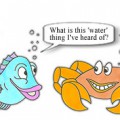
Mastering hypnotic language, like everything, takes practise
This is a guest post from our head hypnosis downloads scripts writer and hypnotherapy trainer Joe Kao
Have you ever heard someone use hypnotic language patterns so masterfully that part of you just went, “Wow! How on earth do you get to be that good!”?
Perhaps it was just a single phrase uttered by the hypnotherapist that completely flipped things around for the client, or perhaps it was a longer hypnotic induction which wove together a captivating blend of story, rhythm and tone shift with an artful array of embedded suggestions. But whatever it was, you were in awe.
Prefer to watch instead?
Why we’re not all masters of hypnotic language
Hypnotic language is an abiding passion of mine, and I just love discovering new ways to powerfully communicate ideas to my clients. However, like most people, when I was first starting out I did feel a bit awkward actually getting my mouth round speaking in this new and unfamiliar way. It just didn’t feel natural to me to say things like “And you can relax even deeper, can you not?” I worried that I would sound silly. Not to mention feel silly!
So how do you get really good at hypnotic language? I’ve identified three key principles I use:
1) Write it down
Doing ‘a little bit every day’ works wonders when you’re learning a new skill. This is how I taught myself to juggle. Rather than spending hours dropping the balls and getting frustrated, I just left the juggling balls by my desk, and once or twice a day, when I wanted a break, I’d pick them up and have a go for a few minutes. No huge effort, no pressure, no obligation. And after a few weeks, I started to get good.
What got me really good at hypnotic language was writing out a list of all the major hypnotic language patterns and spending a few minutes every day combining them in different ways. I would try to pack as many as I could into a paragraph. Like this:
“And the more you remember the relaxation that’s within… comfort… can spread in a way… that’s right… for you… now… can begin to wander… deep within… about how you could drift in… two times… the depths of comfort… are yours to explore… who it is you are… now becoming… so much more of the best of who you’ve always been… at heart…”
2) Listen to other hypnotists
Find some high-quality hypnosis downloads or scripts and listen to them regularly. This is a brilliant way to familiarize yourself with this way of speaking, so that it begins to feel more and more natural. After some time, you might want to write down some of the language patterns you hear that you particularly like and incorporate them into your own work.
Pay attention to the shifts in rhythm and voice tone that the hypnotherapist uses, notice how they use silence, then practise doing the same with your own voice.
3) Record your own hypnosis
Some people say they don’t like listening to recordings of their own voice, but in fact this is an excellent way to improve how you sound. I used to record myself doing inductions again and again, and each time I’d get a bit better at combining the hypnotic language patterns, and a bit better at delivering them in a congruent voice tone.
Record yourself regularly on a dictaphone or on your computer, either reading out an induction you’ve written or (even better) creating one as you go. And then listen to it. Notice what’s good, and what needs improving, about your hypnotic language and your voice.
All this requires commitment on your part, it’s true, but I promise you, if you follow these tips for just thirty days, you’ll notice yourself being naturally more hypnotic in everyday life, and any hypnosis sessions you undertake will flow so much more effortlessly.
You might even begin to glimpse just how creative and artful you’re capable of becoming with your hypnotic language skills – something that I hope will spur you on to practise even more!
Joseph Kao DHypPsych(UK) began training in hypnotherapy and NLP in 2001, and he has run a private hypnotherapy practice in London since 2005. Joe has co-authored several hundred professional hypnotherapy scripts for Hypnosis Downloads, and he is the co-developer of Precision Hypnosis, the Uncommon Knowledge advanced hypnosis training course.










